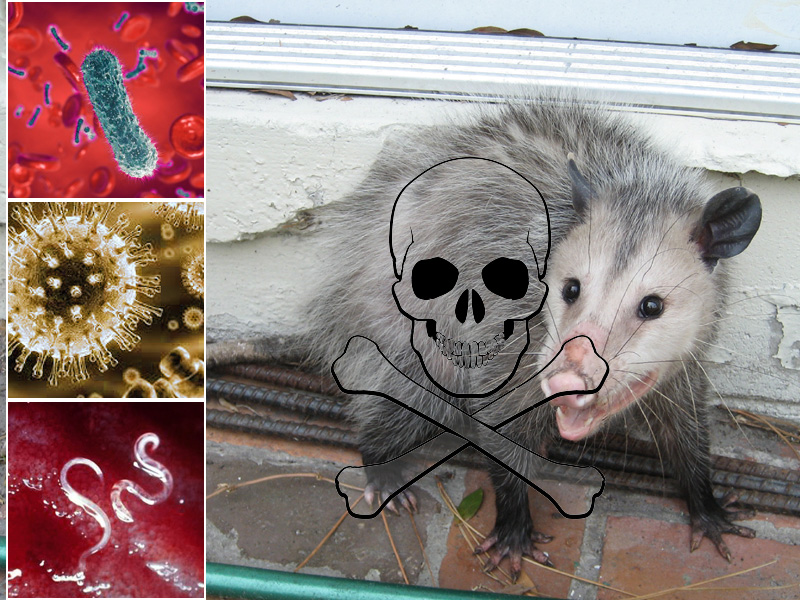- USA Opossum Removal Education Guide and Resources
Opossum Diseases Transmitted to Humans or Dogs

Opossum Diseases - One of the important concerns that many people will have if they come into contact with a wild animal is whether or not they could catch a disease, and how the disease can be transmitted. There are plenty of different precautions you should take if you have to deal with a problem animal, and by knowing about the different diseases you can prepare appropriately to deal with the problem. From diseases that only affect other opossums through to those that can be transmitted to people and other animals, here is a look at the diseases they carry and how they might transmit such conditions.
How Can An Opossum Transmit Disease?
Opossums may appear to be cute animals, but behind that charming exterior lies a wild animal, and it can transmit disease through the usual methods of scratching and biting the victim. It is also worth noting an opossum's habit of playing dead if it is startled by a bright light, and when it is approached, it may quickly attack before looking for somewhere it can escape. It is also worth noting that the animal's feces can transmit several conditions, so if you are dealing with an opossum or an area around the home where the opossum has been present, it is important to take it seriously and to take the right precautions.
Diseases That Affect Humans
There are many different types of diseases that are carried by opossums that can be transmitted to people, and those transmitted through urine and feces are often the most easy to catch, such as leptospirosis, which has flu like symptoms for most people, but can cause kidney damage, meningitis and even death in a small number of cases. Salmonella is a condition that is largely believed to be related to food poisoning, but can also be transmitted by opossums, and while it causes diarrhea for most people, the elderly and young children may find themselves at risk of more severe symptoms, with reactive arthritis one possible side effect.
Diseases Opossums Transmit To Other Animals
Coccidiosis is another condition transmitted by feces, which often causes problems such as diarrhea for domestic animals as they are often inquisitive about the feces of other animals if it is found within their territory. Particularly prevalent in small animals such as rabbits and hares along with opossums is Tularemia, which can lead to several problems including respiratory problems, glandular issues and even ulcers appearing on the body. If you think a domestic pet may have come into contact with an opossum, it is worth monitoring their condition closely and taking them to a veterinarian if they develop any symptoms. Opossums are also known to be carriers of equine protozoal myeloencephalitis (EPM), which can be transmitted to horses and is known
The Opossum's Immune System
One of the most interesting aspects of an opossum's biology is that the body temperature of the animal is significantly lower than that of many other species, and what this means in practical terms is that it is quite resistant to many different types of diseases. This also helps to reduce the number of diseases that the animal can carry, and while it has a fair share of conditions that can be transmitted to others, it certainly doesn't carry the same issues as rats or raccoons. Indeed, this lower blood temperature is said to be a part of the animal's protection from snake bites and even rabies, which struggle to take hold in the animal's body.
Dealing With An Opossum
When it comes to dealing with an opossum that is becoming a problem, the best option is to trap the animal and either to kill it humanely or to relocate it if your state's rules allow such relocation. The traps are best located in areas where the animals visit regularly, and bait such as apples, fish, meat and even pet food can all be attractive to the opossum. Once you have caught the animal in the trap, make sure you wear clothing with long sleeves and thick gloves when dealing with the cage, and where possible it is best to put a blanket over the cage as this not only calms the animal down, but also helps to prevent any scratches if the opossum lashes out, and also reduces the spread of any odor if the opossum releases the scent from its anal glands, which is a self defense mechanism.
Precautions To Take If You Have To Deal With Opossum Feces
Like the feces of some other species, zoonotic diseases such as leptospirosis and salmonella can be transmitted by opossum feces, so the best approach is to be careful and to try and minimize any disturbance of the feces which can release spores and bacteria. If you are going into a confined space, such as an attic, it is best to wear a breathing mask and goggles, along with long sleeved clothes and gloves to prevent any skin contact. Dispose of the feces in a sealed bag or container, and remove any other contaminated material.
Go back to the main Opossum Removal page for more information about opossum disease, and which ones humans can get, or pets such as cats or dogs.

